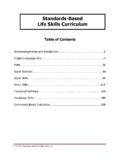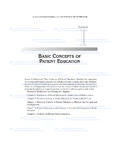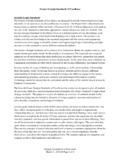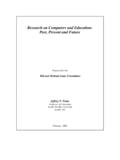Transcription of Teaching Thinking Skills - qsm.ac.il
1 SCHOOL IMPROVEMENT RESEARCH SERIES(SIRS)Research You Can UseClose-Up #11 Teaching Thinking SkillsNovember 1991 Kathleen CottonPerhaps most importantly in today's information age, Thinking Skills are viewed as crucial for educatedpersons to cope with a rapidly changing world. Manyeducators believe that specific knowledge will not beas important to tomorrow's workers and citizens as theability to learn and make sense of new information. D. Gough, 1991 INTRODUCTIONT hroughout history, philosophers, politicians,educators and many others have been concerned with theart and science of astute Thinking . Some identify thespirit of inquiry and dialogue that characterized thegolden age of ancient Greece as the beginning of thisinterest.
2 Others point to the Age of Enlightenment,with its emphasis on rationality and progress(Presseisen 1986, p. 6).In the twentieth century, the ability to engage incareful, reflective thought has been viewed in variousways: as a fundamental characteristic of an educatedperson, as a requirement for responsible citizenship ina democratic society, and, more recently, as anemployability skill for an increasingly wide range Gough's words quoted at the beginning of thisreport typify the current viewpoint in education aboutthe importance of Teaching today's students to thinkcritically and creatively. Virtually all writers onthis subject discuss Thinking Skills in connection withthe two related phenomena of modern technology andfast-paced change.
3 Robinson, for example, states inher 1987 practicum report: Teaching children to become effective thinkers isincreasingly recognized as an immediate goal students are to function successfullyin a highly technical society, then they must beequipped with lifelong learning and Thinking skillsnecessary to acquire and process information in anever-changing world (p. 16).8/10/06 9:03 PMTeaching Thinking SkillsPage 1 of 19 , et al. (1987) underscore this point,characterizing Thinking Skills as means to making goodchoices: Thinking Skills are necessary tools in a societycharacterized by rapid change, many alternatives ofactions, and numerous individual and collective choicesand decisions (p.)
4 216).The societal factors that create a need for well developed Thinking Skills are only part of the story,however. Another reason that educators, employers, andothers call for more and better Thinking skillsinstruction in schools is that American young people,in general, do not exhibit an impressive level of skillin critical or creative Thinking . The followingobservation from Norris's 1985 review is typical:Critical Thinking ability is not widespread. Moststudents do not score well on tests that measureability to recognize assumptions, evaluate arguments,and appraise inferences (p. 44).Likewise, Robinson notes that:While the importance of cognitive development hasbecome widespread, students' performance on measures ofhigher-order Thinking ability has displayed a criticalneed for students to develop the Skills and attitudesof effective Thinking (p.
5 13).There is yet another major force behind the call forimproved Thinking Skills instruction. Educators arenow generally agreed that it is in fact possible toincrease students' creative and critical thinkingcapacities through instruction and practice. Ristow(1988) notes that, in the past, these capacities haveoften been regarded as:a fluke of nature, a [that] are either possessedor not possessed by their owner and that education cando very little to develop these qualities (p. 44).Ristow then goes on to say:However, a great deal of the research currently beingreported indicates that the direct Teaching of creativeskills can produce better, more creative makes this point even more forcefully,asserting that:The most basic premise in the current Thinking skillsmovement is the notion that students CAN learn to thinkbetter if schools concentrate on Teaching them HOW todo so (p.
6 17).DEFINITIONST hinking Skills . Critical Thinking . Creativethinking. Higher-order Thinking . Those who take aninterest in this field of study soon realize that theycannot go tossing off these terms in a casual manner,since there are no universal agreements as to theirprecise meanings., for example, has been variouslydefined as:CRITICAL THINKING8/10/06 9:03 PMTeaching Thinking SkillsPage 2 of 19 and reasonable Thinking that is focusedon deciding what to believe or do (Robert Ennis, quotedin Presseisen, p. 24)The disposition to provide evidence in support ofone's conclusions and to request evidence from othersbefore accepting their conclusions (Hudgins and Edelman1986, p.
7 333)The process of determining the authenticity,accuracy and worth of information or knowledge claims(Beyer 1985, p. 276).Beyer goes on to say that "critical Thinking has twoimportant dimensions. It is both a frame of mind and anumber of specific mental operations" (p. 271). Norris(1985) agrees, stating that:Having a critical spirit is as important as thinkingcritically. The critical spirit requires one to thinkcritically about all aspects of life, to thinkcritically about one's own Thinking , and to act on thebasis of what one has considered when using criticalthinking Skills (p. 44).Lists of alternative definitions could also begenerated for other terminology commonly used in thethinking Skills literature.
8 In an attempt to come toterms with these definitional differences, Alvino, inhis 1990 "Glossary of Thinking - Skills Terms," offers aset of definitions which are widely though notuniversally accepted by theorists and programdevelopers. For purposes of the present report, thesedefinitions are applicable. They include:Popular instructional modeldeveloped by the prominent educator Benjamin Bloom. Itcategorizes Thinking Skills from the concrete to theabstract knowledge, comprehension, application,analysis, synthesis, evaluation. The last three areconsidered HIGHER-ORDER 'S mental operations involved inthinking; the biological/neurological processes of thebrain that facilitate novel way of seeing or doingthings that is characterized by four components FLUENCY (generating many ideas), FLEXIBILITY (shiftingperspective easily), ORIGINALITY (conceiving ofsomething new), and ELABORATION (building on otherideas).
9 CREATIVE process of determining theauthenticity, accuracy, or value of something;characterized by the ability to seek reasons andalternatives, perceive the total situation, and changeone's view based on evidence. Also called "logical" Thinking and "analytical" Thinking Skills instructioninto the regular curriculum; infused programs arecommonly contrasted to SEPARATE programs, which teachthinking Skills as a curriculum in process of planning, assessing,and monitoring one's own Thinking ; the pinnacle ofmental set of basic and advancedskills and subskills that govern a person's mentalprocesses. These Skills consist of knowledge,dispositions, and cognitive and ability to apply Thinking skillstaught separately to any subject(p.)
10 50). Thinking Skills RESEARCHThis summary is based on a review of 56 of these are reports of research 8/10/06 9:03 PMTeaching Thinking SkillsPage 3 of 19 reviews and are cited, with annotations, in the KeyReferences section of the bibliography. Twenty-threeare descriptive, theoretical, or guidelines documentsor are concerned with research in areas other than theeffectiveness of programs and practices. These reportsare itemized in the General the 33 key documents, 22 are research studies orevaluations, and 11 are reviews or syntheses ofresearch. Subjects of these investigations include:general (or unspecified) student populations - 12reports, elementary students - 9, secondary students -9, and both secondary and postsecondary students - research involved regular, gifted, EMR, and Chapter1 student populations; a representative range ofracial/ethnic groups; and a balance of urban, suburban,and rural settings.









